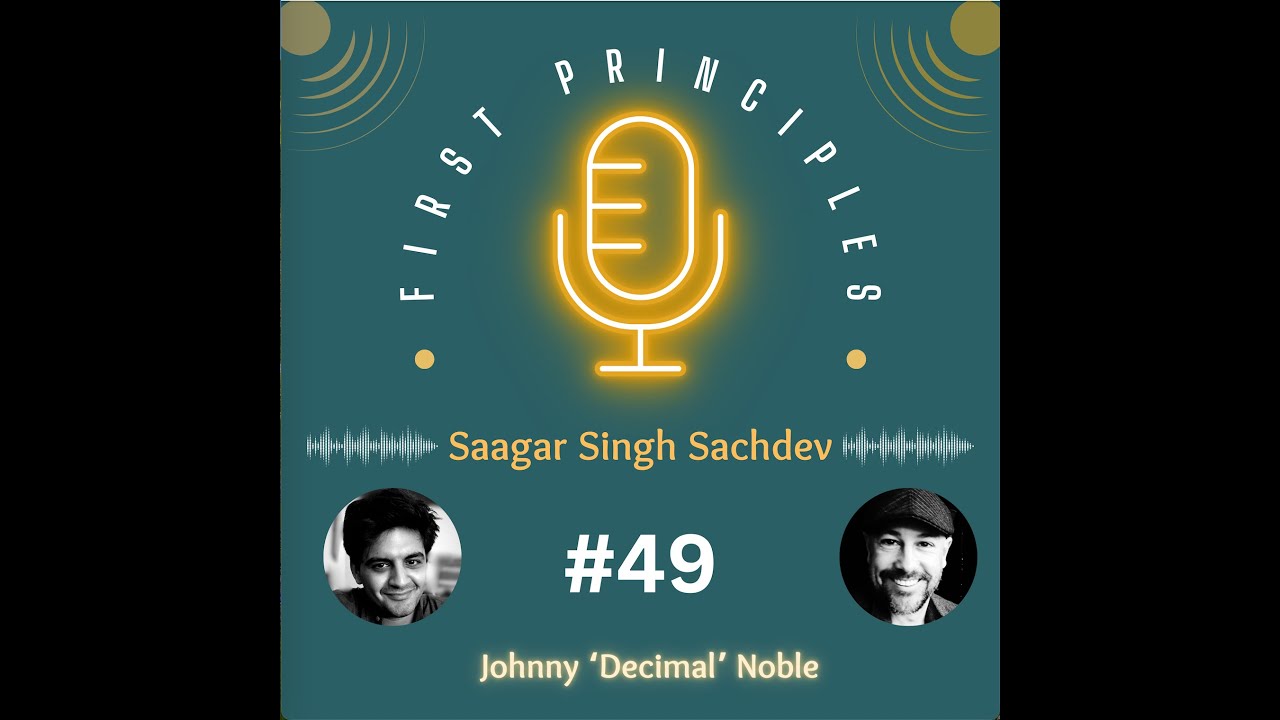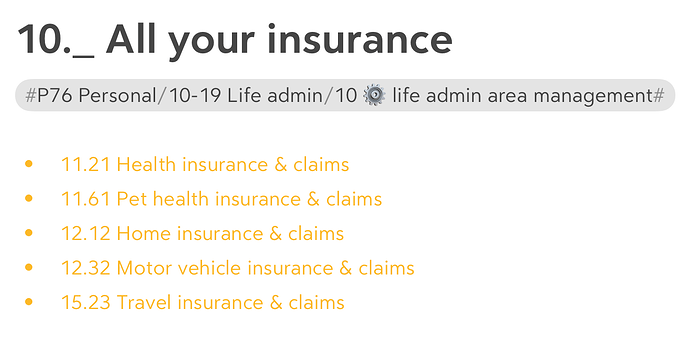Saagar Singh Sachdev was kind enough to have me as a guest on his ‘First Principles’ podcast. Here it is.
Hey Johnny,
I listened to the whole thing. Nice to hear how humble and open you are and clear with how you’re going through a process yourself.
I felt like that you didn’t sell yourself or JD very well, FYI. I love your work and your system. If I was new to hearing about your work, I think I would have wanted a clearer pitch of the power of the system and the comfort it gives people right off the top. I think your first bit in there was about how to divide into tens, but then you passed it off as a “read the website” sort of moment? I think a “what is it, and so what” pitch can be something useful for first-timers.
“If you divide your life up into addresses, then you can start working with the addresses themselves as much as conference-talk.pptx. You can start using the addresses for timeboxing your calendar, organizing your closet, adding sticky notes to your plastic storage bins, and telling your loved ones where your estate planning documents are. Knitting the organization of life together is what we’re trying to do.”
Some kind of pitch like that, strong verbs, short sentences, grand ambitions to really hook newcomers in.
RE: Living documents like budgets or to-do lists, vs. never changing files like birth certificates: I suspect the solution to this one is something you already have: The Standard Zeros. The point of living documents is to give one a birds-eye view of a lot of moving parts right? Things like budgets, to-do lists, grocery shopping lists, albums of friends and family through the years etc. all fit into the category of “something I want to update and keep an eye on throughout time”. If one uses sufficiently broad IDs, then the standard zeros automatically become less about the description of any one thing, and more about the integration of all the sub-areas together, including their competition for finite resources like time and money, perhaps?
Yeah I’m not much of a self-promoter. I appreciate the advice here; I’ll take it on.
I guess it’s in the theme of people wanting to be organised vs. wanting to watch a workshop. I need to figure out a nice way of clearly explaining the benefit of the system before I explain how the numbers work.
And on the Standard Zeros, yeah, I’ve been thinking about that in the context of both ‘life admin’ and ‘small business’. As a mechanism to tie things together.
Example: life admin has 5 insurances. It’d be nice to see them all together…
(We consciously designed insurance to be next to the insured thing. The same occurs in small business.)
I haven’t thought hard about this yet. Opinions welcome.
I have scattered but related thoughts. Maybe not useful:
I’ve been thinking of how to use my files independent of my notes app/index.
Inspiration comes from: Using static websites for tiny archives – alexwlchan and Everything I built with Claude Artifacts this week
It’s now possible, I think, to ask Claude/AI to build simple local HTML files to view other files. I’ve been thinking of how I would use that in relation to JD, and in my estimation this would be like a meta file. It would embed other files into a collection.
As a concrete example, for the last few years, every time my partner and I have been traveling somewhere, I steal photos of her from behind her shoulder looking at a nice view. I want to one day put together an album together of these and gift it to her, with some cutesy message like “I’ll follow you anywhere~”. My photos are organized by date (as I think is reasonable), but I don’t have anywhere to make an “album”. Having an HTML album in “the standard zeros” solves that, I think. Still a file, still in my system, and still points to the raw files.
Same, I think with collections of insurance files. My own thoughts on this are poorly formed, just something I’ve been thinking about lately, because personally, I have never used the standard zeros, and now I’m thinking they have immense value.
I wonder if one of the currently-spare 06 or 07 becomes 06 Collections or something like that… ¯\_(ツ)_/¯
Congratulations featuring on the podcast ![]()
I enjoyed listening and using it as a body double/reinforcement of the process whilst organising my university work, even though I am a graduate… I know how to prioritise tasks you see!!
You are definitely selling yourself short, and a very humble person. I am enjoying watching this JD system forming, and your personal journey.
This is such a lovely & kind gift idea! Make sure you build that album, regardless of system used.
One thought I had about this recently. As I was reading the The standard zeros - #12 by interrato with the alternate system, I needed to write it out on paper myself to follow along. It’s one of those things that makes sense intuitively, but the notation for it is hard to follow because you have to record things in so much repetitive detail (just like double-entry bookkeeping).
I thought it would be worth exploring how it’s standard locations that is what is of value to humans. The numbers are great, and in a sense the essence of the system, and yet they also distract. I keep thinking the primary function of the numbers in JD are to make sure things sort and nest, and to make sure everything gets a unique ID. Essentially: numeric space behaves like regular predictable 2D space, while alphabetic space can warp unexpectedly. ![]() =-O
=-O
I don’t know what the right balance is, but maybe focus on the standard names first, since those are standardized too, and introduce the numbers later. ‘Every category has its inbox, archive, WIP at the start … and every area does too, you put things in as specific a place as possible now, and move it to a more specific place later.’
Here’s a bold thought: given the right tooling, a user of JD should be able to never use the numbers. The right tooling would ensure that they have max ten areas with max ten categories, and each new thing created in a category gets a serially increasing ID. The numbers are still essential, but would be created under the hood. After all, the use of the index to find things by name is the main way of interacting with the system.
And yet I get that somehow you have to explain the decimal stuff because that is what makes it work, and what makes it unique.

